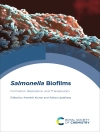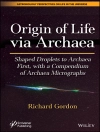This book discusses recent advances in our understanding of the role of oxidants in microbial pathophysiology, providing valuable insights into the complex role of reactive oxygen species (ROS) in host-microbial interactions. The various chapters take readers through the function of ROS in infections ranging from viral to bacterial, and describe how microorganisms have developed complex strategies to not only avoid contact with phagocyte-derived oxidants, but also protect themselves from injury when oxidants are encountered. Featuring the latest research in the field of microbial diseases, this timely book is a ready reference for scientists looking to develop new anti-microbial drugs.
Innehållsförteckning
Role of reactive oxygen species in the correlation between host and microbes.- Blood biomarkers of oxidative stress in human and canine leishmaniosis.- Reactive Oxygen and Nitrogen Species in the Oral Cavity.- Role of gut microbiota in combating oxidative stress.- Role of ROS in T. cruzi intracellular development.- Arginase: a prospective regulator of oxidative stress during microbial pathogenesis.- Oxidative stress as a determinant of antimicrobial action, resistance and treatment.- The biological impact of oxidative metabolism in trypanosomatid parasites: what is the perfect balance between reactive species production and antioxidant defenses?.- Oxidative Stress: A boon or bane for Trypanosomatids diseases?.- Redox regulatory circuits as targets for therapeutic intervention of bancroftian filariasis: biochemical, molecular and pharmacological perspectives.- Oxidative stress and antioxidant defense mechanism in the human enteric protozoan parasite Entamoeba histolytica.- Oxidative Stress in Protozoan Parasites: A Close Surveillance of Proteases and Endogenous Protease Inhibitors in Host-Parasite Interaction.- Oxidative Stress and Antioxidants in Host Defense in Leishmaniasis.- Oxidative Stress in Entamoeba histolytica.- Oxidative stress regulation in Giardia lamblia.- Role of reactive oxygen species in infection by the intracellular Leishmania parasites.- Oxidative Stress and Brucellosis.- Oxidative stress and Antioxidant Supplementation on immunity in Hansen’s Disease (Leprosy).- Neonatal septicemic Escherichia coli protease (Ssl E) induces macrophage activation and polarization through induction of ROS and NO.- Oxidative Stress, Pathophysiology and Immunity in Brucellosis.- Oxidative Stress in Candida albicans Infection.- Advances on Metabolism and Disposition of Benzamidazoles Antihelmintic in Fascioola Hepatica.- Oxidative stress in malarial diseases: Plasmodium-human host interactions and therapeutic interventions.- Exploring endoperoxidesas leishmanicidal compounds.- Photodynamic therapy against bacterial biofilm: role of reactive oxygen species.- Potentials of phytopharmaceuticals for treating microbiological and oxidative stress induced type ii diabetes.- Modulation of the host-parasite redox metabolism to potentiate antimalarial drug efficiency.- Mechanistic and Structural Insights into Oxidative Stress in Malaria and anti-malarial drug metabolism.- Oxidative stress inducers as potential anti-leishmanial agents.
Om författaren
Dr. Sajal Chakraborti is Professor of Biochemistry at the Department of Biochemistry and Biophysics, University of Kalyani, West Bengal, India. His research covers the role of proteases, oxidant and Ca2+ signalling in the pathogenesis of a variety of diseases. Dr. Chakraborti received his Ph D from Calcutta University (1982) and DSc from Kalyani University (2014). He did postdoctoral research at the Johns Hopkins University (Baltimore), University of Utah (Salt Lake City) and New York Medical College (New York), USA. He received a DBT-Senior overseas research award for his research at the University of Florida, Gainesville, USA. Prof. Chakraborti been engaged in teaching and research for the past 40 years and has published over 120 original papers, 25 book chapters and 15 review articles published in different international journals of repute and also edited 12 books published by Springer.
Dr. Tapati Chakraborti is Professor of Biochemistry inthe Department of Biochemistry and Biophysics, University of Kalyani, West Bengal, India. After completion of Ph D at the CSIR-Indian Institute of Chemical Biology, Kolkata (1993), she did postdoctoral research at the University of Florida, Gainesville, Florida, USA. She is currently involved in teaching and research in elucidating Leishmania pathogenesis. She has published over 100 original research papers in reputed international journals and 20 chapters in books published by leading international publishers. She also edited three books published by Springer.
Dr. Dhrubajyoti Chattopadhyay is currently the Vice Chancellor of Amity University (Kolkata). He did post doctoral research in the Department of Cell Biology at the Roche Institute of Molecular Biology, New Jersey (1985–1987), and also in the Department of Molecular Biology at the Cleveland Clinic Foundation, Ohio (1987–1988). He was also Pro-Vice Chancellor (Academic Affairs) at Calcutta University. He has published over 100 original research articles in international journals of repute, as well as several chapters in books published by leading international publishing companies.
Dr. Chandrima Shaha is the former Director of the National Institute of Immunology, New Delhi, where she is currently the Professor of Eminence. Dr. Shaha is a J.C. Bose National Fellow, and her research interests include the understanding of modalities of cell death. Her laboratory is also involved in basic research on cancer biology. Dr. Shaha has received a number of awards, including the Ranbaxy Science Foundation Award for Basic Medical Research, Om Prakash Bhasin Award in Biotechnology and the Archana Sharma Memorial Award of the National Academy of Sciences. She has published over 100 original research papers
in different internationals of repute.












